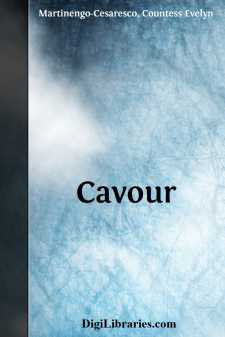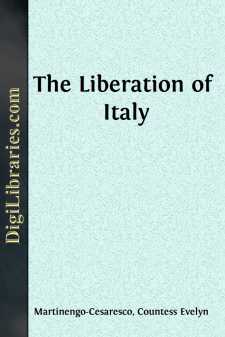Categories
- Antiques & Collectibles 13
- Architecture 36
- Art 48
- Bibles 22
- Biography & Autobiography 813
- Body, Mind & Spirit 142
- Business & Economics 28
- Children's Books 16
- Children's Fiction 13
- Computers 4
- Cooking 94
- Crafts & Hobbies 4
- Drama 346
- Education 46
- Family & Relationships 57
- Fiction 11829
- Games 19
- Gardening 17
- Health & Fitness 34
- History 1377
- House & Home 1
- Humor 147
- Juvenile Fiction 1873
- Juvenile Nonfiction 202
- Language Arts & Disciplines 88
- Law 16
- Literary Collections 686
- Literary Criticism 179
- Mathematics 13
- Medical 41
- Music 40
- Nature 179
- Non-Classifiable 1768
- Performing Arts 7
- Periodicals 1453
- Philosophy 64
- Photography 2
- Poetry 896
- Political Science 203
- Psychology 42
- Reference 154
- Religion 513
- Science 126
- Self-Help 84
- Social Science 81
- Sports & Recreation 34
- Study Aids 3
- Technology & Engineering 59
- Transportation 23
- Travel 463
- True Crime 29
Cavour
Description:
Excerpt
CHAPTER I
HEREDITY AND ENVIRONMENT
Nothing is permanent but change; only it ought to be remembered that change itself is of the nature of an evolution, not of a catastrophe. Commonly this is not remembered, and we seem to go forward by bounds and leaps, or it may be to go backward; in either case the thread of continuity is lost. We appear to have moved far away from the men of forty years ago, except in the instances in which these men have survived to remind us of themselves. It is rather startling to recollect that Cavour might have been among the survivors. He was born on August 10, 1810. The present Pope, Leo the Thirteenth, was born in the same year.
It was a moment of lull, after the erection and before the collapse of the Napoleonic edifice in Italy. If no thinking mind believed that edifice to be eternal, if every day did not add to its solidity but took something silently from it, nevertheless it had the outwardly imposing appearance which obtains for a political régime the acceptance of the apathetic and lukewarm to supplement the support of partisans. Above all, it was a phase in national existence which made any real return to the phase that preceded it impossible. The air teemed with new germs; they entered even into the mysterious composition of the brain of the generation born in the first decade of the nineteenth century.
Environment and heredity do not explain all the puzzle of any single man's mind and character, but they form co-efficients in the making of him which can be no longer disregarded. The chief point to be noticed in reference to Cavour is that he was the outcome of a mingling of race which was not only transmitted through the blood, but also was a living presence during his childhood and youth. His father's stock, the Bensos of Cavour, belonged to the old Piedmontese nobility. A legend declares that a Saxon pilgrim, a follower of Frederick Barbarossa, stopped, when returning from the Holy Land, in the little republic of Chieri, where he met and married the heiress to all the Bensos, whose name he assumed. Cavour used to laugh at the story, but the cockle shells in the arms of the Bensos and their German motto, "Gott will recht," seem to connect the family with those transalpine crusading adventurers who brought the rising sap of a new nation to reinvigorate the peoples they tarried amongst. Chieri formed a diminutive free community known as "the republic of the seven B's," from the houses of Benso, Balbo, Balbiani, Biscaretti, Buschetti, Bertone, and Broglie, which took their origin from it, six of which became notable in their own country and one in France. The Bensos acquired possession of the fief of Santena and of the old fastness of Cavour in the province of Pignerolo. This castle has remained a ruin since it was destroyed by Catinat, but in the last century Charles Emmanuel III. conferred the title of Marquis of Cavour on a Benso who had rendered distinguished military services. At the time of Cavour's birth the palace of the Bensos at Turin contained a complete and varied society composed of all sorts of nationalities and temperaments....



